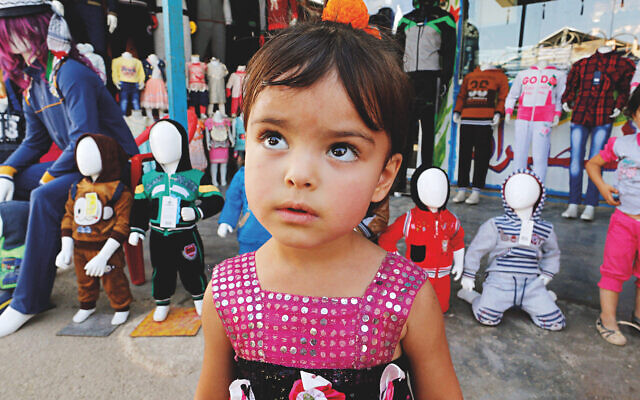SPECIAL REPORT: ‘We want to live… there is no life here’
Richard Ferrer visits a Syrian refugee camp in Jordan to see how MDA UK is playing a vital role in efforts to ease the world’s worst refugee crisis
Beside a motorway on the outskirts of Amman, indistinguishable from the surrounding wasteland, is a godforsaken place 50 children call home.
To refugee aid agencies it is nameless – one of dozens of “random camps” dotted between the Jordanian capital and Syrian border, 30 miles north. To those who must live here, stuck in the mud with nowhere else to go, it is called Aishwarya.
Three rows of tents, a water tank and a chemical toilet cover roughly the size of a football pitch. The biggest tent, sleeping around 20, has been made homely with rugs, sofas, pillows and pink plastic flowers wrapped around the steel poles keeping it up. A tiny TV hangs on the far wall, displaying the words ‘No input signal’.
I’m here in late September – weeks before the nights turn cold – with the Jordanian Red Crescent, to see how British NGO Magen David Adom UK has joined the international relief effort to support Syrian refugees.
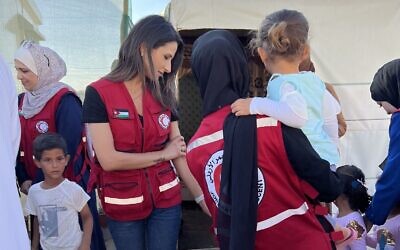
Its first shipment, 103,000 items ranging from blood pressure tablets to skin infection cream, arrived the previous week with a second delivery due next month.
We are invited to hand out gifts – school bags and books, pens, pads and toys. The children line up excitedly to receive them. Some offer a fist bump or high five. A few answer questions filtered through a translator who turns fast-paced Arabic into single, simple English sentences. Broken lives in broken English. Everything is broken.
One girl, maybe aged 10, in a baggy white t-shirt, long black skirt and sandals, tells the translator: “We came here for the future but now we are stuck. We want to live; there is no life here.” I ask who “we” is – did she arrive with her mother and is her mother still here? What happened to her father? Does she have siblings?… but she’s already walking away – keener on the queue than my questions. Her gift is a school bag. A school bag for a child who doesn’t go to school.
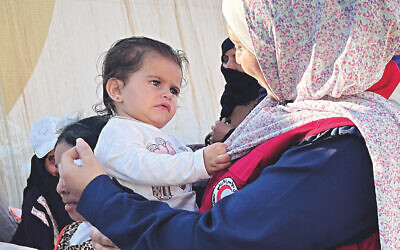
A little boy with skin sores, perhaps caused by poor hygiene, emerges from the line proudly holding his new magnetic drawing board. Another girl of similar age, still waiting her turn, has an eye infection that’s spread to her cheek. The adults in the camp want to arrange a hospital visit and hope we might help. We have a meeting at the Jordan Red Crescent Society the next day so promise to mention her.
There’s no school transportation so under 13s are expected to attend camp lessons run by parents. Only the brightest are encouraged to learn. Over 14s work the land with the adults to ensure there is food to eat.
There are two meals a day, breakfast at 7am and supper at 8pm, comprised of vegetables and dairy derivatives.
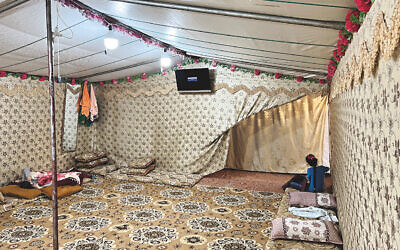
Camps on private farmland receive electricity, depending on the generosity of the landowner. Those without are forced to divert electricity from lampposts.
Sicknesses change with the season. Heading into autumn the children risk asthma and bronchitis. Most ailments can be easily treated with paracetamol or common antibiotics but bringing even everyday medicines into the camp is a challenge. Rare genetic abnormalities, due to intermarriage, are sometimes seen.
The average family has five-to-seven children. Child marriage is common.
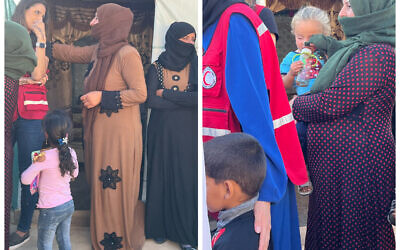
The ongoing 12-year Syrian civil war has caused the world’s worst refugee crisis. Four bordering countries – Jordan, Turkey, Iraq and Lebanon – now host more than 18 million people in need of constant humanitarian support.
The Hashemite Kingdom has 700,000 (half under the age of 18), comprising seven percent of its total population. And, according to Jordan’s Syrian Refugee Affairs Directorate, there’s no hope in sight. “Refugees will remain refugees and camps will remain camps,” it recently warned.
Without the oil trillions of other Arab states, a struggling economy and 40 percent youth unemployment, Jordan must rely on NGOs like the UN Refugee Agency (UNHCR), International Health Partners, American Near East Refugee Aid (ANERA) and, since 2020, Magen David Adom UK – which primarily funds Israel’s Red Cross.
At ANERA’s Amman headquarters earlier that day, a young staff member – who asked to remain anonymous for reasons that soon become clear – describes the process of sending medication into the camps.
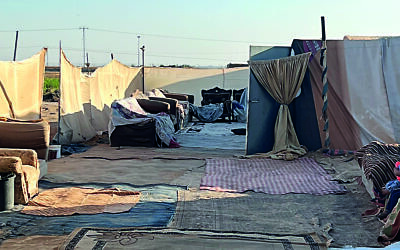
“We have staff on site who electronically catalogue every prescription so it goes to the right patient. We’ve begun measuring the impact our medication has on the population’s general health but it’s a long-term project. We’ve just received our biggest sea shipment of medication for chronic illnesses, worth £1.2millon. This will make a big difference on the ground in the coming months.”
ANERA also supports refugees socially and economically through education and job creation schemes. “There’s no transportation between the camps and schools so education is poor or non-existent. Refugees must go to Egypt (300 miles away) to get a basic work permit. They cannot get a car, a loan, buy a property or access skilled jobs, even if they are qualified. It’s pure discrimination.”
Without the oil trillions of other Arab states, Jordan must rely on NGOs like Magen David Adom UK – which primarily funds Israel’s Red Cross.
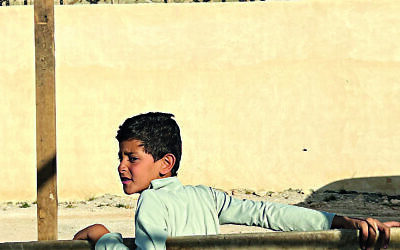
Has ANERA faced opposition to its work with MDA UK, a charity funded by British Jews ostensibly for Israel, or for receiving supplies from Israeli medical giant Teva Pharmaceuticals? “We have Christians, Muslims and Jews on our board, which helps navigate some of the political bureaucracy,” she says. “We are proudly apolitical and take neutrality very seriously. Empathy is the driving force of our work.”
Suddenly, she veers off script with a withering attack on the political status quo. “Politics, however, does get in the way. We need to remove the vicious cycle of division here in the Middle East. We are victims of politicians who don’t represent our best interests. One of the main reasons refugees struggle is that politicians don’t want them to move forward.”
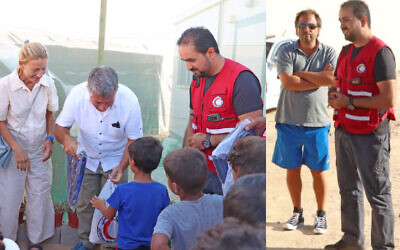
She goes on: “Generation Z is less afraid to speak truth to power, especially on social media. We are not going to put up with the old systems of control that force us to prove we are not who the other side suspects and fears – be it Jews, Arabs or Syrian refugees here in Jordan. We are burned out by instigating governments who instil hatred. Why is it such a big deal to open borders to refugees? Giving people access to what they desperately need shouldn’t be political. These people need empathy, compassion, citizenship and basic rights.”
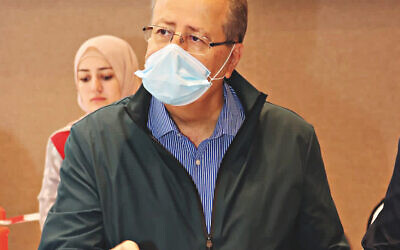
Next morning, the ANERA woman’s words still ringing in my ears, I visit the Jordan Red Crescent Society hospital in Amman, where more than 700 operations on child refugees (funded by the Qatari and Kuwaiti red crescents) have been performed so far this year.
Jordan Red Crescent president Dr Mohammed Al-Hadid is immediately asked about the little girl with the eye infection we met in Aishwarya. Can she be helped? “If she needs an operation she will be sent here,” he says. “Thanks to support from red cross societies, including The Royal College of Surgeons in Ireland, we can perform operations even if patients cannot afford to pay.
“We have 20 surgeons arriving from Kuwait next month to perform 100 operations on Syrian refugees in the space of four days. If this girl can be identified and diagnosed, then yes, she might be among those we help.”
• Find out how you can help support MDA UK’s vital work in Jordan by visiting mdauk.org – you can make a donation HERE

Thank you for helping to make Jewish News the leading source of news and opinion for the UK Jewish community. Today we're asking for your invaluable help to continue putting our community first in everything we do.
For as little as £5 a month you can help sustain the vital work we do in celebrating and standing up for Jewish life in Britain.
Jewish News holds our community together and keeps us connected. Like a synagogue, it’s where people turn to feel part of something bigger. It also proudly shows the rest of Britain the vibrancy and rich culture of modern Jewish life.
You can make a quick and easy one-off or monthly contribution of £5, £10, £20 or any other sum you’re comfortable with.
100% of your donation will help us continue celebrating our community, in all its dynamic diversity...
Engaging
Being a community platform means so much more than producing a newspaper and website. One of our proudest roles is media partnering with our invaluable charities to amplify the outstanding work they do to help us all.
Celebrating
There’s no shortage of oys in the world but Jewish News takes every opportunity to celebrate the joys too, through projects like Night of Heroes, 40 Under 40 and other compelling countdowns that make the community kvell with pride.
Pioneering
In the first collaboration between media outlets from different faiths, Jewish News worked with British Muslim TV and Church Times to produce a list of young activists leading the way on interfaith understanding.
Campaigning
Royal Mail issued a stamp honouring Holocaust hero Sir Nicholas Winton after a Jewish News campaign attracted more than 100,000 backers. Jewish Newsalso produces special editions of the paper highlighting pressing issues including mental health and Holocaust remembrance.
Easy access
In an age when news is readily accessible, Jewish News provides high-quality content free online and offline, removing any financial barriers to connecting people.
Voice of our community to wider society
The Jewish News team regularly appears on TV, radio and on the pages of the national press to comment on stories about the Jewish community. Easy access to the paper on the streets of London also means Jewish News provides an invaluable window into the community for the country at large.
We hope you agree all this is worth preserving.


